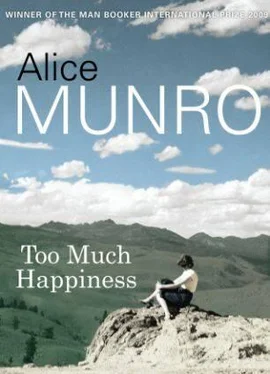All this was accomplished.
Jaclard did not bother to mail back the passport until Aniuta joined him, and then she returned it. No money was ever repaid.
Sophia sent notes from her hotel in Paris to Marie Mendelson and Jules Poincaré. Marie’s maid responded that her mistress was in Poland. Sophia sent a further note to say that she might ask her friend’s assistance, come spring, in “selecting whatever costume would suit that event which the world might consider the most important in a woman’s life.” In brackets she added that she herself and the fashionable world were “still on fairly confused terms.”
Poincaré arrived at an exceptionally early hour of the morning, complaining at once about the behavior of the mathematician Weierstrass, Sophia’s old mentor, who had been one of the judges for the king of Sweden’s recent mathematical prize. Poincaré had indeed been awarded the prize, but Weierstrass had seen fit to announce that there were possible errors in his-Poincaré’s-work which he, Weierstrass, had not been given time to investigate. He had sent a letter submitting his annotated queries to the king of Sweden-as if such a personage would know what he was talking about. And he had made some statement about Poincaré being valued in future more for the negative than the positive aspects of his work.
Sophia soothed him, telling him she was on her way to see Weierstrass and would take the matter up with him. She pretended not to have heard anything about it, though she had actually written a teasing letter to her old teacher.
“I am sure the king has had much of his royal sleep disturbed since your information arrived. Just think of how you have upset the royal mind hitherto so happily ignorant of mathematics. Take care you don’t make him repent of his generosity…”
“And after all,” she said to Jules, “after all you do have the prize and will have it forever.”
Jules agreed, adding that his own name would shine when Weierstrass would be forgotten.
Every one of us will be forgotten, Sophia thought but did not say, because of the tender sensibilities of men-particularly of a young man-on this point.
She said good-bye to him at noon and went to see Jaclard and Urey. They lived in a poor part of the city. She had to cross a courtyard where laundry was hung-the rain had stopped but the day was still dark-and mount a long, somewhat slippery outdoor staircase. Jaclard called out that the door was unbolted, and she entered to find him sitting on an overturned box, blacking a pair of boots. He did not stand up to greet her, and when she started to remove her cloak he said, “Better not. The stove isn’t lit till evening.” He motioned her to the only armchair, which was tattered and greasy. This was worse than she had expected. Urey was not here, had not waited to see her.
There were two things she had wanted to find out about Urey. Was he getting more like Aniuta and the Russian side of his family? And was he getting any taller? At fifteen, last year in Odessa, he had not looked more than twelve.
Soon she discovered that things had taken a turn that made such concerns less important.
“Urey?” she said.
“He’s out.”
“He’s at school?”
“He may be. I know little about him. And the more I do know the less I care.”
She thought to soothe him and take up the matter later. She inquired about his-Jaclard’s-health, and he said his lungs were bad. He said he had never got over the winter of ’71, the starvation and the nights in the open. Sophia did not remember that the fighters had starved-it was their duty to eat, so that they could fight-but she said agreeably that she had just been thinking about those times, on the train. She had been thinking, she said, about Vladimir and the rescue that was like something out of a comic opera.
It was no comedy, he said, and no opera. But he grew animated, talking about it. He spoke of the men shot because they were taken for him, and of the desperate fighting between the twentieth and the thirtieth of May. When he was captured at last, the time of summary executions was over, but he still expected to die after their farcical trial. How he had managed to escape God only knew. Not that he believed in God, he added, as he did every time.
Every time. And every time he told the story, Vladimir’s part-and the General’s money’s part-grew smaller. No mention of the passport either. It was Jaclard’s own bravery, his own agility, that counted. But he did seem to be better disposed to his audience, as he talked.
His name was still remembered. His story still was told.
And more stories followed, also familiar. He rose and fetched a strongbox from under the bed. Here was the precious paper, the paper that had ordered him out of Russia, when he was in Petersburg with Aniuta some time after the days of the Commune. He must read it all.
“Gracious sir, Konstantin Petrovich, I hasten to bring to your attention that the Frenchman Jaclard, a member of the former Commune, when living in Paris was in constant contact with representatives of the Polish Revolutionary Proletariat Party, the Jew Karl Mendelson, and thanks to the Russian connection through his wife was involved in the transfer of Mendelson’s letters to Warsaw. He is a friend of many outstanding French radicals. From Petersburg Jaclard sent most false and harmful news into Paris about Russian political affairs and after the first of March and the attempt against the czar this information passed all bounds of patience. That is why at my insistence the minister decided to send him beyond the borders of our empire.”
Delight had come back to him as he read, and Sophia remembered how he used to tease and caper, and how she, and even Vladimir, felt somehow honored to be noticed by him, even if it was only as an audience.
“Ah, too bad,” he said. “Too bad the information is not complete. He never mentions that I was chosen by the Marxists of the International in Lyon to represent them in Paris.”
At this moment Urey came in. His father went on talking.
“That was secret, of course. Officially they put me on the Lyon Committee for Public Safety.” He was walking back and forth now, in joyful rampaging earnest. “It was in Lyon that we heard that Napoleon le Neveu had been captured. Painted like a whore.”
Urey nodded to his aunt, removed his jacket-evidently he did not feel the cold-and sat down on the box to take up his father’s task with the boots.
Yes. He did look like Aniuta. But it was the Aniuta of later days to whom he bore a resemblance. The tired sullen droop to the eyelids, the skeptical-in him scornful-curl to the full lips. There was not a sign of the golden-haired girl with her hunger for danger, for righteous glory, her bursts of wild invective. Of that creature Urey would have no memory, only of a sick woman, shapeless, asthmatic, cancerous, declaring herself eager for death.
Jaclard had loved her at first, perhaps, as much as he could love anybody. He noted her love for him. In his naïve or perhaps simply braggartly letter to her father, explaining his decision to marry her, he had written that it seemed unfair to desert a woman who had so much attachment to himself. He had never given up other women, not even at the beginning of the liaison when Aniuta was delirious with her discovery of him. And certainly not throughout the marriage. Sophia supposed that he might still be attractive to women, though his beard was untidy and gray and when he talked he sometimes got so excited that his words came in a splutter. A hero worn out by his struggle, one who had sacrificed his youth-that was how he might present himself, not without effect. And it was true, in a way. He was physically brave, he had ideals, he was born a peasant and knew what it was to be despised.
Читать дальше












